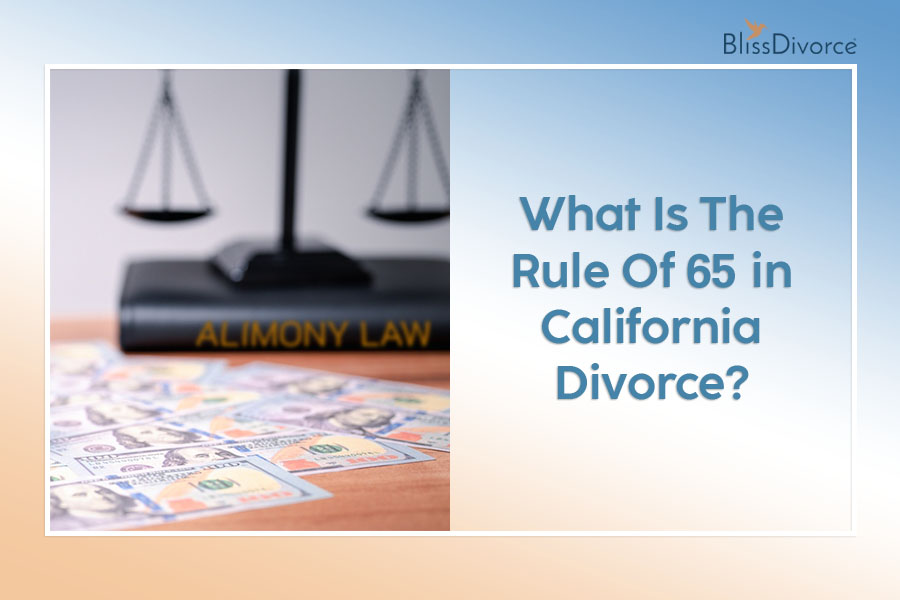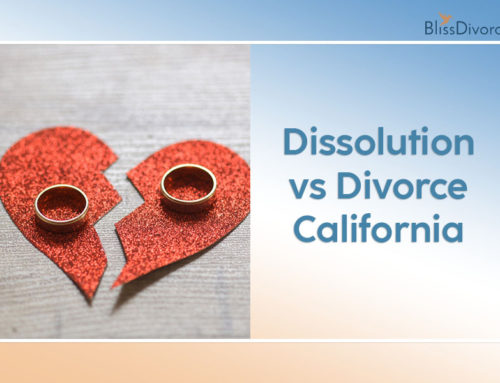Please note that all online divorce platforms are not the same. Much of the content below does not apply to BlissDivorce. BlissDivorce is the only complete online divorce solution, including property division, child custody, spousal support, and AI-powered Digital Divorce Mediation.
Spousal support in California divorces can be complex due to the many legal considerations and factors, including the Rule of 65. But what is the Rule of 65 in California divorce?
Read on for more on this factor and how it may affect your divorce case.
What Is the Rule of 65 in California Divorce?
The Rule of 65 is a factor California courts consider when determining how long alimony should be paid. The rule applies to long marriages, i.e., those over 10 years, where the judge may order long-term spousal support.
According to California divorce law, there are two types of spousal support: temporary and long-term. If you seek divorce and spousal support, you must first research if you qualify. This is because, contrary to common misconception, alimony is not always ordered during divorce cases in California.
To determine the amount and length of alimony, the court considers each factor listed in the California Family Code § 4320. The judge often may order short-term spousal support that might last several months or years.

Source: shutterstock.com / Photo Contributor: FabrikaSimf
How does the Rule of 65 affect spousal support in California?
Suppose you and your spouse were married for 10 or more years; in that case, the judge may order long-term or indefinite support. We should mention the term ‘indefinite’ does not necessarily mean forever.
In court terms, indefinite means order support without a time limit at the time it is made. The support may last until the receiving spouse becomes self-supporting, dies, or remarries. So, what is the Rule of 65 in spousal support?
Rule of 65 applies if the age of the recipient at the time of divorce plus the number of years they were married equals or is more than 65. If this is the case, spousal support may be paid indefinitely, even if the marriage was less than 10 years.
The judge will consider and evaluate the following factors when determining spousal support:
- Marketable skills of the supported spouse.
- Age and health of both spouses.
- Time and expense needed for the supported spouse to acquire education or skills for employment.
- The paying spouse’s ability to pay support.
- The length of the marriage.
- Assets and debt obligations of both spouses.
- Tax implications for each spouse.
- Standard of living established during the marriage.
How does the Rule of 65 impact the division of assets in a California divorce?
California is a community property state, so every asset acquired during the marriage is split equally between you and your spouse in the case of a divorce. If the Rule of 65 applies in your divorce, even in a five-year marriage, retirement 401K funds will be split equally. The only assets not subject to community property are those each spouse had before marriage or received as a gift/inheritance.
Calculation of the Rule of 65
The Rule of 65 applies to spousal support calculations. To calculate if the Rule of 65 applies to your case, the court considers the years your marriage lasted plus the age of the support recipient at the time of separation. If the calculated number equals or exceeds 65, the court may order the paying spouse to pay alimony indefinitely.
Exceptions and Considerations
There are several exceptions to long-term spousal support, including the following.
- Retirement age of the paying spouse – In California, the retirement age might be usually around 65. Yet, the state has no specific, uniform retirement age set by law. So, you aren’t obligated to keep working to pay support if you reach retirement age. Another consideration that the judge may take is if the paying spouse works in a field where the standard retirement age is lower than 65.
- Cohabitation considerations – California is a no-fault state, so an affair won’t impact the court’s decision. The court may consider lowering the amount or time of alimony if the recipient is cohabiting with a partner, meaning their standard of living is the same as during marriage.
- Short marriage – If your marriage lasted under five years, the Rule of 65 would not apply despite the recipient’s age as the court considers the marriage length too short.

Source: shutterstock.com / Photo Contributor: Mdisk
Conclusion
What is the Rule of 65 in California divorce? The Rule of 65 is a factor California courts may consider in your divorce to determine the length of spousal support. If the rule applies in your case, the court may order long-term spousal support.




